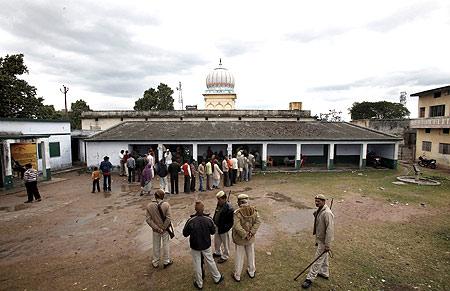
Jawaharlal Nehru, Indira Gandhi, Atal Bihari Vajpayee, Rajiv Gandhi ...
Lal Bahadur Shastri, V P Singh, Charan Singh and Chandra Shekhar -- all drew political life from Uttar Pradesh, the state that has historically played a pivotal role in India's political landscape.
Uttar Pradesh is India's most politically important state. With 80 MPs, it hogs the largest number of seats in the Lok Sabha.
Such is its electoral might that Maharashtra with the second most number of MPs ranks almost half way behind with 48 Lok Sabha seats.
If UP was an independent nation, it would be the world's fifth most populous country.
The state with 403 assembly constituencies is witnessing an election spread over a month. This election will not only decide the course of UP, but that of the United Progressive Alliance government in New Delhi.
Historically, UP has played a key role in India's political landscape. It is no wonder that eight of India's 14 prime ministers have Uttar Pradesh connections.
Please click 'Next' to see who these prime ministers are
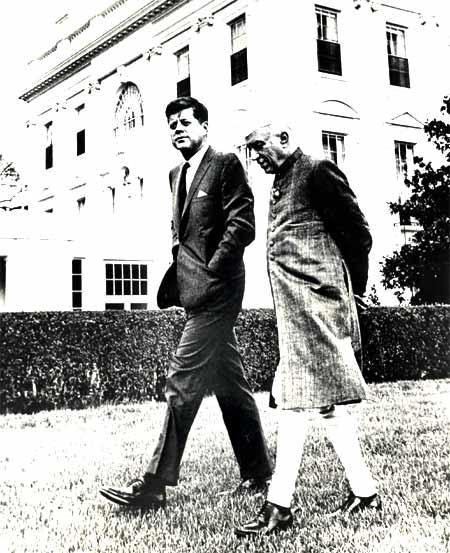
Birthplace: Allahabad
MP from Phulpur
Party: Congress
The first prime minister of India. He is also the longest continuously serving premier -- with about 17 years, or 6,131 days -- to be precise!
Highlights: The Indo-Pak '47 war; the India-China '62 war; initated IITs/IIMs/AIIMS; created the Planning Commission and Five Year Plans; co-founded the Non Aligned Movement; provided asylum to the Dalai Lama...
A prolific writer and thinker, Nehru laid the foundations of India's institutions and was at the helm of its fledgling democracy.
Conferred the Bharat Ratna in 1955.
Also See: Nehru's Legacy: A Review
Please click 'Next' to see who the other prime ministers are

Birthplace: Moghalsarai
MP from Allahabad
Party: Congress
Held office for 582 days and died in Tashkent while negotiating peace with Pakistan in January 1966.
Highlights: The Indo-Pak war of 1965; pushed for the Green Revolution; Operation Flood; gave the slogan 'Jai Jawan Jai Kisan'.
Conferred the Bharat Ratna posthumously in 1966.
Also see: Why has history forgotten this giant?
The politician who made no money
Trouble in Tashkent
Please click 'Next' to see who these other prime ministers are

Birthplace: Allahabad
MP from Rae Bareli
Party: Congress
Served as prime minister twice -- from January 1966 to March 1977 and again from January 1980 up to her assassination on October 31, 1984.
She was in office for 5,831 days, just 300 days short of her father, Jawaharlal Nehru.
Highlights: Abolished privy purses; nationalised banks; first nuclear test; victory in the 1971 war with Pakistan; Imposition of the Emergency; Operation Blue Star.
Indira Gandhi was assassinated by her Sikh bodyguards as a consequence of Operation Blue Star, launched to flush Khalistani militants lodged in the Golden Temple.
The biggest blot of her prime ministership was the imposition of the Emergency that reduced India to a tin-pot dictatorship for 19 months.
She led India to its most decisive military victory against Pakistan and is considered the country's strongest prime minister, even by her opponents.
Conferred the Bharat Ratna in 1971.
Also See: 'Isn't death inevitable, she asked'
The Errors of Simla
Please click 'Next' to see who these other prime ministers are
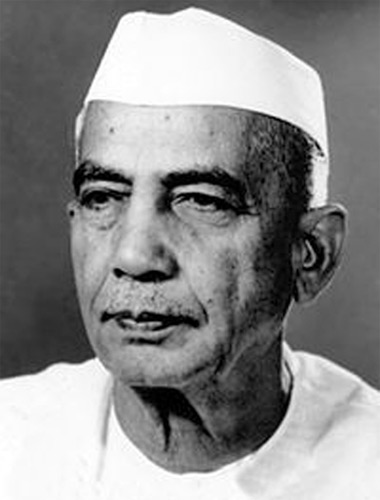
Birthplace: Noorpur, Meerut district
MP from Baghpat
Party: Janata Party
He never faced Parliament, even though he was in office for 171 days.
Within days of assuming office, the Congress withdrew support, after which he continued as caretaker prime minister till fresh elections were held.
His son Ajit Singh, leader of the Rashtriya Lok Dal, represents Baghpat. Ajit Singh's son Jayanta Chaudhary is the MP from Mathura.
Also see: The pursuit of power and policy
Please click 'Next' to see who these other prime ministers are
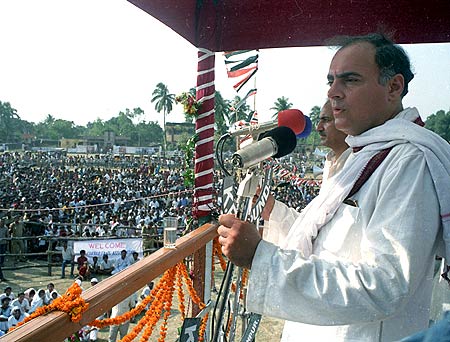
Birthplace: Mumbai
MP from Amethi
Party: Congress
The country's youngest prime minister, he assumed office at the age of 41 after his mother Indira Gandhi's assassination.
Highlights: Led the Congress to the biggest win in Indian politics; the anti-Sikh riots and the Bofors scandal took place during his tenure; launched the communication revolution; signed the Indo-Sri Lankan accord.
Rocked by the Bofors scandal, his party lost power in 1989. He was assassinated by an LTTE human bomb during an election campaign in Sriperumbudur on May 21, 1991.
Conferred the Bharat Ratna posthumously in 1991.
Also see: Sonia Gandhi on Rajiv Gandhi
Please click 'Next' to see who these other prime ministers are
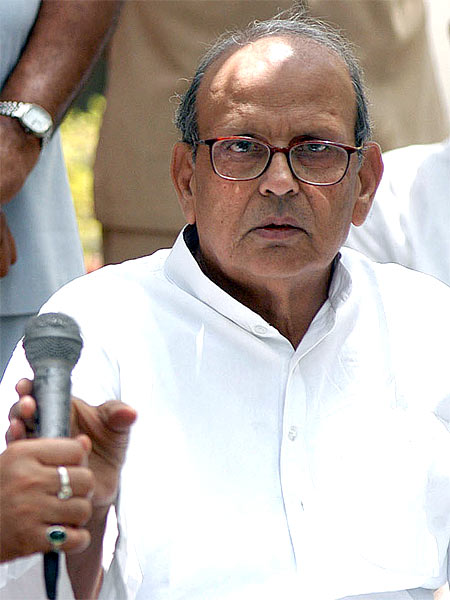
Birthplace: Allahabad
MP from Fatehpur and former chief minister of Uttar Pradesh
Party: Janata Dal
V P Singh headed the National Front government and served as prime minister for less than year. He lost the vote of confidence in Parliament after the BJP withdrew support over the Babri Masjid issue.
Highlights: A former Congressman, V P Singh led the assault against the Rajiv Gandhi government in the Bofors deal; implemented the Mandal Commission recommendations that reserved seats for the backward classes in government institutions.
He died of cancer on November 27, 2008 in New Delhi. The news of his death was overshadowed by the 26/11 terror attacks in Mumbai.
Also see: V P Singh on the Rediff Chat
Please click 'Next' to see who these other prime ministers are
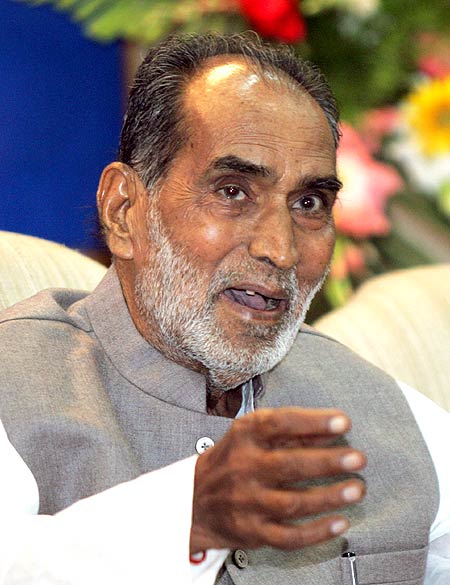
Birthplace: Ballia
MP from Ballia
Party: Samajwadi Janata Party
Chandra Shekhar represented Ballia eight times in Parliament and was a powerful grassroot leader who had played a frontline role against Indira Gandhi during the Emergency.
He served as prime minister for only 224 days as leader of a precarious majority, in coalition with the Communist parties and the BJP.
The Congress provided outside support, but boycotted Parliament, accusing Chandra Shekhar of spying on Rajiv Gandhi.
He resigned in March 1991.
He died of cancer in July 2007.
Also see: Chandra Shekhar fancied himself as the only man to make an authentic prime minister of India
Please click 'Next' to see who these other prime ministers are

Birthplace: Gwalior, Madhya Pradesh
Five-time MP from Lucknow
Party: Bharatiya Janata Party
Vajpayee served as India's prime minister for two terms. The first stint for only 14 days; the second from March 1998 to May 2004.
Highlights: India joined the nuclear-armed nations with the Pokhran test; Kargil War; the Gujarat riots took place during his tenure; the Agra summit with Pakistan; infrastructure development.
He was elected to Parliament nine times and remains the BJP's tallest leaders. A poet-politician and a powerful orator, no one in the BJP can match Vajpayee's standing and charisma.
Aged and ailing, he has withdrawn from politics.
Also see: